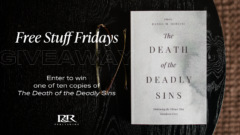Today I will make a horrifying admission, one that might just cast a shadow of doubt over my life, ministry and masculinity. Ready for it? I enjoy Jane Austen movies. I don’t just enjoy them, actually, but really, really enjoy them. I hate chick flicks as much as the next guy, but thoroughly enjoy Austen movies. And no, I do not consider those to be contradictory statements.
Last night my sister and brother-in-law suggested that my wife and I join them for dinner and a movie. The options were simple: King Kong (which was deemed to be too long), The Lion, The Witch and the Wardrobe (which I have already seen) or Pride and Prejudice. I eventually convinced the rest of the group that we should see the chick flick. And so we caught a 7:30 showing of Pride and Prejudice.
I thoroughly enjoyed the movie as I enjoyed Sense and Sensibility and Emma before it. I suppose you could just say that I’m a big fan of these films.
I don’t watch these movies because of the stories. Austen’s plots were adequate, I guess, but I find them quite unappealing. I care little for the love story that holds her plots together. Had the movie ended with Darby and Elizabeth standing before Judge Judy to contest ownership of an engagement ring (instead of the inevitable snuggling and spooning) it would not have made the movie much better or worse for me. You see, there are three things that especially appeal to me in Austen’s stories (and hence in the films): the characters, the setting and the dialogue.
It seems quite clear that Austen had a great and perhaps vicious sense of humor. She always includes at least a character or two in her stories that are pure comic relief. In Pride and Prejudice there is an Anglican rector who is just a pathetic specimen and Austen goes to great lengths to make him a laughing stock. There is also the mother of the main character, a woman who lives her life with only one goal: to see her daughters get married. She is a gossip and a busybody and will stop at nothing to secure relationships. But her mouth always runs away with her and she gets nowhere. These comical characters always leave me laughing.
I also love the Victorian setting. Most of the bigger-budget films are able to satisfactorily replicate the original setting. I enjoy seeing the interaction between the various strata of society. I enjoy the viciousness of the upper class and the disgust elicited by and towards the lower classes. I enjoy interpreting Austen’s own opinions towards those who were fortunate enough to rank higher than she did, and those unfortunate enough to rank lower. One need not look far to find some frank statements about Victorian British society.
And above all I love Austen’s dialogue. It is very difficult to do dialogue properly. I might go so far as to say that it is easier to create good characters and a good plot than it is to craft good dialogue. Yet Austen did dialogue very well. The quick back-and-forth, sarcastic, multi-levelled exchanges between characters is what makes the stories work. The strong female characters always manage to remain a step ahead of everyone else. They are rarely at a loss for words. I often find myself laughing out loud (to my wife’s chagrin) as the characters berate each other in a dignified, backhanded manner.
I suppose the reason I love Austen is that I love words. And Jane Austen was a bona fide master of the word. She was able to craft characters that were just believable enough and dialogue that said just enough but never too much. Learning from Austen is learning from a master.
And so I make this dreadful admission and look forward to the next big screen adaptation of one of Jane Austen’s novels.









